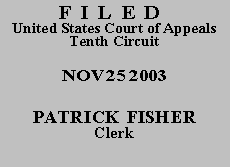

| CLARENCE DWIGHT HINES,
Petitioner-Appellant, v. ELVIS HIGHTOWER, Warden, Respondent-Appellee. |
|
Clarence Dwight Hines appeals from the district court's orders dismissing his habeas petition brought pursuant to 28 U.S.C. § 2241, and denying his motion for relief under Fed. R. Civ. P. 60(b). We previously granted Hines a certificate of appealability. We now dismiss his appeal from the order denying his § 2241 petition, and affirm the denial of relief under Rule 60(b).
In his petition, Hines complained that the defendant applied an amended Oklahoma Department of Corrections policy concerning good time credits to him in a way that violated the Due Process and Ex Post Facto Clauses of the United States Constitution. Before the district court could decide his petition, Hines was released from incarceration and began serving his term of probation.
On May 9, 2002, the magistrate judge assigned to this case filed a report and recommendation that Hines' petition be dismissed as moot because of his release. The report informed Hines that he must file any objections by May 29, 2002, and that failure to do so would waive his right to appellate review. Hines did not file any objections to the report and recommendation. On May 31, 2002, the district court ordered the action dismissed without prejudice based on Hines' failure to respond, and entered a separate judgment dismissing the action.
Nineteen days later, on June 19, 2002, Hines filed a Rule 60(b) motion, seeking relief from the order of dismissal. The district court entered an order denying the Rule 60(b) motion on June 24, 2002. On July 11, 2002, Hines filed his notice of appeal, attempting to appeal from the order denying Rule 60(b) relief, as well as the earlier order of dismissal.
Hines' attempt to appeal from the district court's order of dismissal is barred for two reasons: (1) he failed to file timely objections to the magistrate judge's report and recommendation, see Fottler v. United States, 73 F.3d 1064, 1065 (10th Cir. 1996), and (2) he did not file a notice of appeal within thirty days of the order of dismissal, as required by Fed. R. App. P. 4(a)(1).(1) This leaves only his appeal from the denial of his 60(b) motion for our consideration.
The district court properly denied the 60(b) motion, for two reasons. First, the motion made no attempt to explain Hines' failure to file a timely objection to the magistrate judge's recommendation. See United States v. One Parcel of Real Property, 73 F.3d 1057, 1060 (10th Cir. 1996) ("[A] party's objections to the magistrate judge's report and recommendation must be both timely and specific to preserve an issue for de novo review by the district court. . . ."). Second, Hines failed to establish in his 60(b) motion that he was entitled to relief from the district court's order dismissing his petition as moot.
Hines' appeal from the district court's order dismissing his § 2241 petition is DISMISSED for lack of jurisdiction. His appeal from the district court's order denying his 60(b) motion is AFFIRMED.
Entered for the Court
Circuit Judge
*. This order and judgment is not binding precedent, except under the doctrines of law of the case, res judicata, and collateral estoppel. The court generally disfavors the citation of orders and judgments; nevertheless, an order and judgment may be cited under the terms and conditions of 10th Cir. R. 36.3.
1. Hines did file his Rule 60(b) motion within the thirty day period. A Rule 60(b) motion, however, does not extend the time for filing a notice of appeal unless it is filed within ten days after the entry of judgment. Fed. R. App. P. 4(a)(4)(A)(vi).